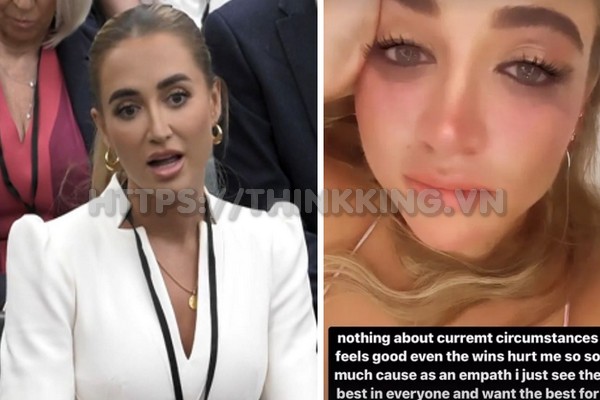Georgia Harrison’s Ordeal: The Viral Spread of a Non-consensual Video
In a revelation that has jolted the underpinnings of digital consent and privacy, Love Island’s Georgia Harrison Video has emerged not just as a reality TV star but as a poignant voice in the outcry against non-consensual content sharing online. Her testimony before a committee of MPs, following the traumatic viral spread of a personal video filmed without her consent, ignites a pressing conversation about the wildfire-like dissemination of such materials and the daunting challenge of extinguishing their reach. This is not merely the tale of a celebrity’s personal strife, but a stark embodiment of the digital era’s darkest pitfalls, resonating with the vulnerabilities that lurk behind every shared pixel. Visit “Thinkking.vn” for more

The Unwanted Spotlight: Georgia Harrison’s Testimony
Georgia Harrison, known for her stint on Love Island, unexpectedly found herself in the unwanted glare of a public ordeal when a personal video was non-consensually filmed and distributed by Stephen Bear, a fellow reality TV star. As the intimate content spread like wildfire across the internet, Georgia’s fame turned into a nightmare. Her court appearance to confront Bear was a poignant scene; she stood dignified while Bear, sentenced for his actions, displayed a contemptuous grin, showing little remorse for the havoc he wreaked on her life. Georgia likened the viral spread of the video to a house on fire, an analogy highlighting the uncontrolled and destructive path of the footage, leaving devastation akin to charred remains. Her testimony was not just about seeking justice but also about spotlighting the dark side of instant viral fame and the dire consequences of privacy invasion.
Navigating the complex judicial system, Georgia Harrison sought justice amidst the digital conflagration of her privacy. Stephen Bear faced criminal proceedings, receiving a 21-month sentence for his part in the non-consensual sharing of intimate content. However, the flames of injustice seemed to lick at the edges of the case as Bear secured an early release after serving just half his term. The legal response to such violations was put under scrutiny, with calls for harsher penalties to deter the sharing of non-consensual images. Georgia’s plea to MPs was impassioned, demanding an overhaul of current laws to better protect individuals’ digital autonomy. She urged for immediate action, emphasizing the urgency of the situation where every moment’s delay could mean the irretrievable spread of personal images. Her voice echoed the need for a legal framework that moves as swiftly as the technology it seeks to regulate.
Digital Platforms Under Scrutiny: The Hosts of the Fire
The viral spread of Georgia Harrison’s video cast a harsh light on digital platforms, scrutinizing their role as unwitting accelerators of the blaze. Reliance on automated responses to manage content has proven insufficient, with these algorithms acting as impersonal gatekeepers, often failing to distinguish between consensual and non-consensual sharing. As social media companies struggle to bridge the accountability gap, victims like Harrison are left in the lurch, their calls for help lost in an automated abyss.
Harrison’s ordeal underscores the dire need for human intervention—real people making nuanced decisions where context and empathy are critical. In her advocacy, she has vehemently called for a shift in how these platforms respond to such crises. She insists on a human touch, a system where empathy is embedded in the process, ensuring that victims are heard, their dignity upheld, and their cases addressed with the seriousness they deserve. Harrison’s demand is clear: digital platforms must become more accountable, responsive, and above all, humane.
The Personal Toll: Emotional and Physical Aftermath
The non-consensual distribution of intimate content took a tremendous toll on Georgia Harrison, both emotionally and physically. The initial shock plunged her into a tumultuous emotional journey, characterized by waves of disbelief, violation, and distress. The intensity of the experience was so overwhelming that it manifested physically, leading to her hospitalization during Christmas, a time traditionally reserved for joy and family.
This ordeal has left an indelible mark on Harrison’s life. She has spoken candidly about the fears that now shadow her daily existence—fears for her safety, her future prospects, and the potential of being perpetually haunted by the incident. The anxiety and stress have likely altered her outlook on relationships, trust, and her career in the public eye.
Georgia’s experience underlines the severe consequences that such privacy breaches can have on individuals, consequences that extend far beyond the initial act and can linger for years, affecting mental health, physical well-being, and future opportunities. Her story is a stark reminder of the human cost of digital irresponsibility and the urgent need for more robust protections and support systems for victims.
The case of Georgia Harrison transcends her celebrity status and taps into a broader societal conversation about privacy, consent, and respect in the digital age. It has highlighted the need to view privacy and consent as universal digital rights, essential for the dignity of all individuals, regardless of their public profile.
Privacy and Consent: Universal Digital Rights The digital realm has blurred the lines of personal boundaries, making it crucial to establish and respect universal digital rights. Privacy is not a privilege but a fundamental right that should be protected by law and respected by individuals and corporations alike. Consent must be explicit, informed, and freely given, without which any sharing of personal content is a violation of one’s autonomy.
Changing the Narrative: Education and Awareness Education and awareness are key to changing the narrative around the sharing of intimate images. It’s essential to foster an understanding that such actions can have devastating effects on individuals’ lives. Educational campaigns can help inculcate a sense of digital responsibility, emphasizing that behind every image and video are real people with rights and feelings.
Support Systems: Resources for Victims Harrison’s case has also underscored the necessity of support systems for victims. There is a pressing need for resources such as legal assistance, psychological support, and online tools to help victims navigate the aftermath of such violations. These resources should be readily accessible, ensuring that victims can receive immediate and effective assistance to mitigate the damage done to their lives.
In essence, the conversation sparked by incidents like Georgia Harrison’s is not just about celebrity privacy infringements but about creating a safer digital landscape for everyone. It’s about building a culture that values consent, champions privacy, and supports those who have been wronged, ensuring that the digital world is an extension of the respectful and dignified society we aspire to be offline.
Policy and Change: What Can Be Done?
Legislative Action: Updating Laws for the Digital Age Governments can play a critical role in protecting digital rights by updating existing laws or enacting new legislation that addresses the complexities of the digital age. This includes:
- Creating Clear Legal Frameworks: Laws need to clearly define what constitutes non-consensual sharing of images and establish severe penalties for such offenses.
- Global Cooperation: Since the internet knows no borders, international collaboration is essential to create laws that can be enforced across jurisdictions.
- Right to be Forgotten: Individuals should have the right to request the removal of their personal data from the internet under certain conditions.
Platform Policies: Enforcing Strict Content Review Online platforms and social media sites must take responsibility for the content shared on their services:
- Strict Content Moderation: Implement and enforce policies that swiftly remove non-consensual intimate images and penalize offenders.
- User Verification: Platforms could require user verification to hold users accountable for their actions and deter malicious behavior.
- Technological Solutions: Develop and employ advanced AI and machine learning tools to detect and prevent the sharing of such content.
Community Support: Mobilizing Collective Action Communities can exert pressure and demand change through collective action:
- Awareness Campaigns: Grassroots movements and advocacy groups can raise awareness about the consequences of sharing intimate images without consent.
- Support Networks: Establish community support groups that provide emotional and practical assistance to victims.
- Educational Programs: Schools and community centers should teach digital citizenship, emphasizing respect for privacy and consent online.
Change requires a multifaceted approach where governments, platforms, and communities work together to foster a safe digital environment. Legislative reforms, platform accountability, and community engagement are all pillars that support the structure of a digitally respectful society.
-
Closing Paragraph: Georgia Harrison’s ordeal transcends her personal narrative, shedding light on a pervasive and insidious issue that afflicts countless individuals in the digital age. Her courage to speak up is a clarion call for urgent reforms and a reminder that the privacy infringements we battle are not mere sparks but raging infernos, threatening to consume the essence of our digital identities. As we stand in solidarity with Harrison, it is imperative that we fan the flames of change, ensuring that respect for consent becomes an unassailable pillar in our interconnected world.
FAQs:
-
What is the Georgia Harrison video incident? A: Georgia Harrison experienced a violation of privacy when a personal video of her was filmed without her consent and shared online.
-
How has Georgia Harrison responded to the incident? A: Harrison has bravely addressed MPs, speaking out against the non-consensual sharing of videos and the inadequate response from digital platforms.
-
What are the legal implications for Stephen Bear? A: Stephen Bear was sentenced to 21 months in prison, serving 10-and-a-half months, for sharing the non-consensual video.
-
What changes is Georgia Harrison advocating for? A: Harrison is advocating for immediate action on reported non-consensual content, better support from social media platforms, and legislative changes.
-
How can the public support individuals like Georgia Harrison? A: The public can advocate for stronger digital privacy laws, support organizations that help victims of non-consensual content sharing, and educate others about consent and digital rights.










